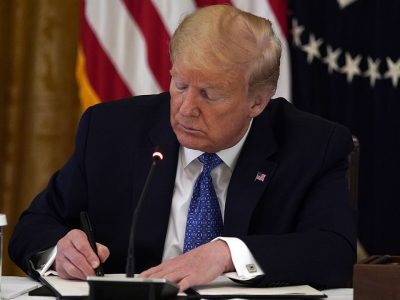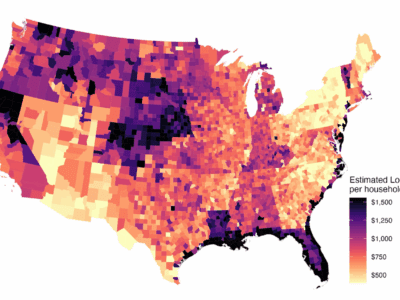Immigration Law is Environmental Law
The recent ICE raid on a Hyundai-LG plant in Georgia highlights a problem in our visa system — and our politics.

Three weeks ago, federal and state agents conducted an immigration raid at a multi-billion-dollar Hyundai-LG battery plant under construction in Ellabell, Georgia and detained some 475 workers. About 300 of these workers were South Korean citizens. 14 were from China, Japan, and Indonesia. Another 145 were from Mexico and other Latin American countries.
As has become common in such ICE operations, the raid involved masked men and firearms in an aggressive show of force. In South Korea, the public has been outraged at the site of shackled workers “perp walked” before cameras and held in prison-like conditions. The South Korean government chartered a plane that transported 316 Koreans and 14 others from the various Asian countries to Seoul and has commenced a human rights investigation to assess ICE treatment of its citizens.
Some observers initially saw this as a purposeful strategy to target several groups at once, including undocumented immigrants, the electric vehicle sector, and potentially political opponents like Georgia Governor Brian Kemp (who refused to help Trump overturn the 2020 election results in his state).
Subsequent developments suggest that the Trump administration actually sees the operation as a mistake, an “own goal” that inadvertently undermines the administration’s stated efforts to revive American manufacturing. Christopher Landau, the US deputy secretary of state, even expressed deep regret over the detainment of Korean citizens. Although ICE officials have framed this as an instance of companies breaking the law and giving away jobs that would otherwise go to Americans, it seems as though the Korean workers were here temporarily to help install equipment at the battery plant and train American workers and that the project is creating American jobs. Many workers reportedly entered the US on B-1 or ESTA visa waivers, which prohibit most work activity but include exceptions such as for specialized workers engaged in equipment installation. ICE has not specified how these workers violated the terms of their visas and its warrant only included limited information about 4 Hispanic individuals – with no reference to the more than 400 other people they eventually detained.
There is no easily obtainable visa category for the types of expert workers needed to support these foreign investments. H1-B visas would more clearly cover the range of expertise needed, but these are capped at 85,000 a year and issued via lottery. There is simply no way companies can be certain of obtaining such visas on the timelines needed for these investment projects. Trump himself posted on Truth Social about the dynamic, recognizing that foreign investors will need to bring in their own experts to establish facilities and train US workers. Georgia Governor Kemp has said the raid should be a catalyst for visa reform.
Green Investment and American Jobs
The ICE raid raises serious concerns about the treatment of a major economic partner, given Georgia’s significant investment in attracting foreign direct investment. The battery plant is part of Hyundai’s $5 billion Metaplant investment, which includes an EV assembly facility that began to produce Ioniq 5 and Ioniq 9 EV models in late 2024. It is the largest economic development project in Georgia history, and is expected to generate 8,500 jobs by 2031. There are apparently contractual clawback provisions that require Hyundai to pay back government subsidies if 80% of that figure is not met. Hyundai’s overall investment in Georgia has since expanded to US$12.6 billion and includes another battery manufacturing facility in partnership with SK On in Bartow County. One estimate suggests that the plant could create 38,000 indirect jobs in Georgia over the next decade. The groundbreaking for the facility back in 2023 was a bipartisan affair including Republic governor Kemp and Democratic Senators Warnock and Ossoff. This is seemingly the type of investment that Republicans (including Trump) and Democrats alike can all support.
The case here is strong evidence of the potential for green development in the US, but it also serves as a clarion call to reform laws that hinder such development. First, the Hyundai investment was driven by anticipated demand for EVs in the United States and its business case was only helped by Inflation Reduction Act incentives that Republicans have now rolled back. The project here merely reminds us of a fact that we have known for a few years now. Green industrial policy has been a boon for Republican states, even more so than Democratic states. Despite that effort by Democrats to share the wealth produced by the policy, most Republicans have turned against this opportunity, whether due to anti-environmental ideology or the special interest lobbying of the fossil fuel industry or American car companies who have largely had trouble producing competitive EVs. Although bipartisanship seems to be dead these days, major job-creating, tax dollar-generating projects like this should be something both parties can get behind.
Second, if we are interested in promoting green development of all sorts, we are going to have to figure out a way to harness various kinds of law and policy – tax, trade, national security, environmental regulation, and immigration law – in ways that support our broader economic and social goals. The Hyundai-LG plant raid highlights a problem in our visa system – the lack of temporary visas to fill jobs that Americans can’t easily assume; here, expert workers to help stand up manufacturing facilities and train American workers. If we like what these projects bring to the US, then we need to design accompanying policies that facilitate more investment and development.
Instead, the ICE raid has antagonized an important trade partner in South Korea, added cost and delay to a major value-creating investment from Hyundai and others, and created a less hospitable environment for future foreign investments in American manufacturing. We can certainly do better than this.
At the same time, the Hyundai project also shows us the bipartisan appeal in a decidedly un-bipartisan age of clean transportation and energy investments that bring jobs and new capabilities to parts of the US in need of greater development.
Reader Comments
2 Replies to “Immigration Law is Environmental Law”
Comments are closed.







Excellent summary of Hyundai project, the immigration law mess, and another blunder by incompetent Trump ICE officials. Thank you Alex.
Thanks, Leslie! Let’s hope the mistakes here lead to a productive policy response and not just performative politics. The new $100,000 H1-b visa announcement makes one worry that a productive policy response is not forthcoming.